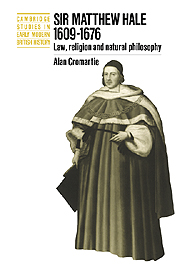Book contents
- Frontmatter
- Contents
- Acknowledgements
- Introduction: a summary life
- Part I Law
- 1 Coke: the appeal to reason
- 2 Selden: the appeal to contract
- 3 The rights of the Crown
- 4 Interregnum
- 5 Protectorate
- 6 Restoration: ‘the nature of laws’
- 7 Restoration: constitutional theory
- 8 Restoration: legal practice
- Part II Religion
- Part III Natural philosophy
- Conclusion
- Appendix: Hale and witchcraft
- Bibliography
- Index
- Titles in the series
4 - Interregnum
Published online by Cambridge University Press: 05 May 2010
- Frontmatter
- Contents
- Acknowledgements
- Introduction: a summary life
- Part I Law
- 1 Coke: the appeal to reason
- 2 Selden: the appeal to contract
- 3 The rights of the Crown
- 4 Interregnum
- 5 Protectorate
- 6 Restoration: ‘the nature of laws’
- 7 Restoration: constitutional theory
- 8 Restoration: legal practice
- Part II Religion
- Part III Natural philosophy
- Conclusion
- Appendix: Hale and witchcraft
- Bibliography
- Index
- Titles in the series
Summary
The Republic was a failure because common law survived. It failed in an obvious sense, when the heir of the king was restored, but this was only the sequel, and perhaps the consequence, of a rather more subtle defeat. Intellectually, it was doomed, to put the matter simply, because it made its claims in legal terms. The ‘Common-Wealth’ (a very frequent spelling) chose to present itself as instrumental, as a means for the promotion of the English public good. But the English conceived of this good as the protection of their liberties, the rights and property that they enjoyed by the authority of common law. Another way to put this point might be to say that common law was the science that defined the common weal, and therefore dictated the structure of the English Common-Wealth. Among the clear prescriptions of this science (in both the senses of the word ‘prescription’) were prerogative rights of the Crown, rights often abused, to be sure, but instituted for the people's sake. The Rump (and still more the Protectors) were thus forced to behave like a king.
A truly republican theory, like that which James Harrington (1611–77) favoured, would need to cast some doubt on these assumptions. It would need in fact to show, like that author's Oceana (1656) and the literature it spawned, that the English constitution was outmoded: that the rights of the Crown guaranteed by common law were no longer appropriate to the country's social state.
- Type
- Chapter
- Information
- Sir Matthew Hale, 1609–1676Law, Religion and Natural Philosophy, pp. 58 - 73Publisher: Cambridge University PressPrint publication year: 1995



